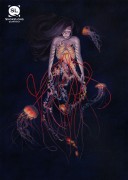Your title, which I’m assuming refers to some of the name possibilities for the turtle, made me very interested in your piece. I kept hoping that they would give way to some explanation, and I’ve realized that two other times you list a set of three names. Do these names signify something meaningful to you?
I had a tremendous amount of fun thinking up names for the turtle. It became this little game: what are all of the things a would-be hip, vaguely sad twentysomething would name an unconventional pet? Like: if you wanted to be very cool, but weren’t sure exactly what cool was, and felt exhausted by the prospect of having always to perform coolness. None of the turtle’s names ever stick in the story; if this turtle were to have a real name, it would be someone screaming in a whisper, “I AM BRUTALLY CLEVER AND HIP!” (with undertones of “SOMEBODY LOVE ME!”).
On the nerdy side: I really love the meter of it. I was teaching high school Shakespeare when I wrote this piece. We’d just spent the day clapping out the stresses in iambs and trochees, and discussing how iambic pentameter is everywhere (try speaking aloud: “I’ll have the daily special and a Coke”). The title I settled on–Leonardo or Lenin or Princess Diana–isn’t in iambic pentameter, but it’s tremendously fun to say. It’s got this almost-rhythm that lulls the tongue into galloping along until the end, where it stumbles just a little.
Jon and Jenna seem to play an important part in the narrator’s life. Why did you not give them more of an explanation?
The specifics of Jon and Jenna are, in a lot of ways, not important to the story. It’s a tenuous “you” who inhabits this second person. Like any “you” in fiction, this you clearly isn’t the reader (unless, by happy coincidence, you also have a maybe-dead pet, and live somewhere that it is very cold, and have fielded wrong numbers for poison control, in which case, respectively: I’m sorry, I’m sorry, and I hope you handled it with grace). But I do think most of us have had long, strange winters; have made rash or uncharitable or hubristic social decisions and had to pay for it in various ways. Jon and Jenna, here, stand in for “unfortunate romantic decision” and “friend who’s not speaking to me for reasons that are maybe justified or maybe not.” Their relative blankness creates a space that most readers can enter (unless they haven’t had either of these social experiences–in which case, they should definitely write a guide book to life; it would sell like gangbusters).
I’m dying to know that the narrator missed when she has to take that phone call!
The best joke ever! The joke you had to be there for. The joke that can definitely never be repeated or explained but that everyone in your social circle is going to bring up until the day you die: the ultimate MO in FOMO.
What inspired you to write a piece about the unexplainable sensation of seeing death?
I love that you asked this question. To me, this piece is less about death than about social anxiety–the sense that, though you are in the best and warmest place ever, there is a small miracle waiting for you in your basement at home (read: me at every party). I’m also interested in the “it doesn’t count unless you take a selfie” attitude of our culture–how this runs counter to the immediacy and authenticity of being in the moment. For this character, whose sense of well-being hinges so powerfully on social inclusion, the ending–the realization that you don’t need anyone to see your happiness in order to validate it, or you–is the first step toward a kind of redemption.
Assuming you don’t have a pet turtle, if you went out and bought one tomorrow what would you name it?
I don’t have a pet turtle. I did have two pet tadpoles when I was eleven, whose names were Snow White and Alfred. As far as the hypothetical turtle-name goes, I can only paraphrase what I seriously said to my (very amused) parents at the time: “You’ve got to get to know the turtle.”



 The core workshop of SmokeLong Fitness is all in writing, so you can take part from anywhere at anytime. We are excited about creating a supportive, consistent and structured environment for flash writers to work on their craft in a community. We are thrilled and proud to say that our workshop participants have won, placed, or been listed in every major flash competition. Community works.
The core workshop of SmokeLong Fitness is all in writing, so you can take part from anywhere at anytime. We are excited about creating a supportive, consistent and structured environment for flash writers to work on their craft in a community. We are thrilled and proud to say that our workshop participants have won, placed, or been listed in every major flash competition. Community works.